Kucinich on Climate Change
Air Date: Week of December 14, 2007
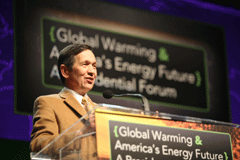
Rep. Dennis Kucinich at the Presidential Forum on Global Warming and America's Energy Future. (Photo: Laura Kleinhenz)
If he were president, what would Dennis Kucinich do to combat climate change? Living on Earth host Steve Curwood moderated the first-ever presidential candidates' forum on global warming, where Representative Kucinich answered just that question. Tune in for the third and final installment of our forum coverage which highlights one of the most serious issues the next commander-in-chief will face.
Transcript
CURWOOD: It’s Living on Earth. I’m Steve Curwood in Bali, Indonesia, at the United Nations Climate change conference. Many speakers during these negotiations have mentioned the U.S. presidential race in some fashion. And with good reason: the next phase of Kyoto will have its final negotiation rounds in 2009, after President Bush has left office. The Bush administration and the government of Turkey are the last holdouts among the developed nations to still be saying ‘no’ to Kyoto. Australia reversed its opposition and began ratification a few weeks ago, after a new prime minister took office. So, what will the next U.S. president do about Kyoto and the whole threat of global warming?
In November I moderated the first-ever presidential forum on global warming. The event in Los Angeles allowed the presidential candidates to explain how they would respond to the challenge of global warming if they made it to the White House. The Republican and Democratic candidates were all invited. Only three—all Democrats—showed up: Senators Hilary Clinton and John Edwards, and Representative Dennis Kucinich. Each of the candidates gave an opening statement, then faced questions from a panel—Mary Nichols, chair of the California Air Resources Board, David Roberts of the online magazine Grist, and me. Today we have excerpts from Representative Dennis Kucinich.
[APPLAUSE]
KUCINICH: Thank you very much. It’s great to be at a presidential forum that’s not sponsored by the coal industry. I just want to say that from the beginning—
[APPLAUSE AND CHEERS]
KUCINICH: As the last one was. But, I want to speak to you today about a vision of the America that can be. It’s a vision that’s held close by so many of us. But it’s seldom articulated from a presidential forum. Let me tell you what I will bring to the presidency – an environmental consciousness that is demonstrated by the choices that I make in my own life. Little home in Cleveland, Ohio, 1600 square feet. A small Ford Focus that gets about you know, 30 some miles to a gallon. A vegan diet that is compassionate and mindful and respectful of the environment. See, if you want a leader who can reach out and lift this planet up, then we have to look at—how do you live? Because you can talk the talk, but do you walk the walk? And so, as I speak to you today, I want to demonstrate to you an awareness and an ability to be able to lead this country forward to a new era of environmental sustainability and environmental consciousness.

Dennis Kucinich (Photo: Laura Kleinhenz)
It starts with an understanding of the world as one. I see the world as being an integrated whole. I understand the world as being interconnected and interdependent. And that the choices each one of us makes affects all of us. As any one of us chooses, so chooses the world. And when you come from that understanding you know the great responsibility that each one of us has, individually. And responsibility that we have collectively as Americans to try to engage in what Thomas Barry called ‘the great work of our lives,’ to repair our relationship with nature and to repair the planet.
Now how would I do that as president? First, we must participate fully in the biological weapons convention, the chemical weapons convention, the small arms treaty, the landmine treaty, join the international criminal court and participate in the next round of climate change talks with a real intention of reducing greenhouse gas and carbon emissions. This is what the United States must do, and this is what a Kucinich presidency will be about. It’s a call to conscience. And it’s also a call for a new vision of what’s possible in America. That’s what I want to share with you in the next six minutes. And that is what I call the ‘works green administration.’ It’s infusing environmental consciousness into every aspect of government and all aspects of our social and economic and political affairs in this country.
And here’s how it would work: it begins with the intention of having every department of the federal government be involved in sustainability and in green consciousness. Let’s go down the list: transportation. Under a Kucinich Administration, massive spending for rebuilding the transportation infrastructure for mass transit so that we can make mass transit available all over America—
[APPLAUSE]
KUCINICH: --in housing, in Senate for building green housing and having the environmental consciousness of our entire building programs be involved in looking at energy-efficient homes, and homes that use natural lighting, in homes that are not using materials that are inherently dangerous. The Department of Energy would provide disincentives for the use of oil, coal and nuclear, and incentivize the creation of wind and solar microtechnologies so that we could create millions of jobs applying those microtechnologies to homes and businesses across this country, dramatically reducing our carbon footprint, moving the economy, government as an engine of sustainability, priming the pump of the economy, lowering energy costs, insulating millions of homes. I mean, we can do this. We have the ability to do it. We need the leadership to do this. And the Department of Education—we would teach our children environmental principles from the earliest age so they could integrate that into the way they live.
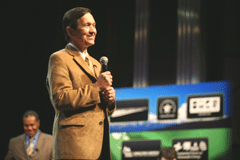
Representative Dennis Kucinich at the Presidential Forum on Global Warming and America's Energy Future. (Photo: Laura Kleinhenz)
[APPLAUSE]
KUCINICH: In the Department of Commerce, all of our trade agreements would be based on environmental quality principles and we would start by canceling NAFTA and creating environmental principles in all of our trade agreements to protect the water and the air and the land.
[CHEERS AND APPLAUSE]
KUCINICH: In the Department of Interior—removing all of these incentives that exist for the extraction of our natural resources. America must stop the exploitation of the land, and protect our Native Americans whose land is being poisoned by uranium mining and other types of mining. We need a president who can take that stand.
[APPLAUSE]
KUCINICH: Those who say that we have to sacrifice into the future, I think that’s misplaced. I think there’s an unlimited amount of wealth out there that’s waiting to be called forward by our creative genius if only we will go green. And so—
[APPLAUSE]
KUCINICH: John F. Kennedy called forth the American people to participate in something that was bigger than all of us. Kennedy said that, ‘let the word go forth at this time and place that the torch has been passed to a new generation.’ We are the generation that we’ve been waiting for, and we just need to move forward with courage and with compassion and with vision to create the world that we want. Thank you very much.
[APPLAUSE AND CHEERS]
KUCINICH: Thank you. Works green administration. Thank you.
CURWOOD: Thank you, Congressman. So join us for a conversation here. You’ve laid out a very ambitious program that I think a lot of folks here seem to like.
[LAUGHTER]
CURWOOD: The question is—you wake up one day in January of 2009, there you are at 1600 Pennsylvania Avenue—how do you do this? People have been talking about this for years and it hasn’t happened. How could you make that difference?
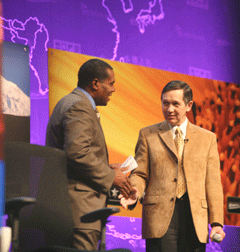
Steve Curwoood and Dennis Kucinich. (Photo: Laura Kleinhenz)
KUCINICH: Well it begins with a president who has the awareness of where the hearts of the American people are. People are ready to go in a new direction. If you have a president who’s really ready to bring about transformation, then you move forward courageously and go to the country, take it to the people. They discovered, by the way, yesterday, a picture of Lincoln at Gettysburg, I’m told. We need to rediscover the principles of that speech at Gettysburg about a government of the people, by the people, and for the people. And elect a president who’s not tied to these interest groups in any way, shape or manner. I mean, I’m ready, Steven. I’m ready today.
[CHEERS AND APPLAUSE]
KUCINICH: Thanks for the chair, but I’m not a chair guy.
[LAUGHTER]
NICHOLS: Let me follow up a little bit on that question because your vision and the way you present it with passion are getting us all excited. And then we remember that we had a vice president once who wrote a book about global climate change and an administration that went to Kyoto and negotiated a treaty and then wasn’t even able to present it to Congress because they were told it was dead on arrival. It couldn’t possibly be acted upon. And the politics in the Senate don’t seem to have changed all that much based on what we’re seeing right now. So, you know, here you are, you come into office with a mandate, but what are you going to do to reverse the dynamics that seem to be mired down in the Congress?
KUCINICH: I mean, you’re absolutely right, there’s tremendous resistance built into the political system. I would have no, no hesitation whatsoever to go over the heads of Congress right to the American people. If we have to free our Congress from these interest groups, I’m the one who will lead the way to do it without any hesitation whatsoever. If you’re ready for that kind of a president, I’m ready for you.
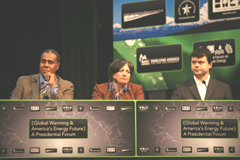
(L-R) Moderator Steve Curwood and panelists Mary Nichols (California Air Resources Board Chair) and David Roberts (Grist.org.) (Photo: Laura Kleinhenz)
[APPLAUSE]
ROBERTS: All right Mr. Kucinich. I think we can acknowledge that not everyone who supports your agenda lives in a large city on the West Coast. But at the same time, not everyone who opposes it lives in the Beltway. There are people who legitimately fear losing jobs, who legitimately fear having their energy prices raised—labor unions, coal miners. There are real people out there who fear the kind of thing you’re talking about. What do you say to them in particular other than—‘50 years from now, we’ll have a better country.’ What do you tell them?
KUCINICH: Well you have to understand the interrelationship between all the economic factors in our economy in order to take a stand for sustainability. Leadership can look at a ‘works green administration’ in producing jobs and creating environmental progress and economic progress that we haven’t see. Let’s talk about mining, for example. I understand coal miners are very concerned about their jobs. Here’s what I’m willing to do: go to the coal miners and tell them, ‘look, we’re going to make sure that you have a pension, that you can have the money to feed your family, and you don’t have to worry about that, because this is the work you chose to do and you did it, and it was important to the country at a point, but now we have to make a transition.’ Now it’s true, there are people who are going to be resistant who aren’t in Washington, and I’m aware of that. But the resistance that you find is generally from the interest groups who are trying to keep, you know, want to keep mining coal, who want to build new coal facilities, who want to build new nuclear plants with all the waste that’s attendant, who want to keep us in oil and fight wars to get it. Those are the interest groups who right now control our government. But under a Kucinich Administration, their control is broken. And if the Congress wants to stand by those interests, we go to the American people, and then we return to a government that the people really control. So I understand what you’re saying. But I’m also ready to take a stand. The question is, are you going to have somebody in the White House who can take a stand, who’s capable of doing it.
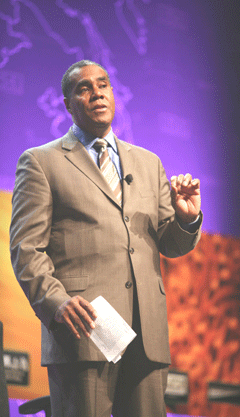
Steve Curwood moderated the forum. (Photo: Laura Kleinhenz)
KUCINICH: Well not just a pension—you’d have a guaranteed income. This is another thing I want to talk about in terms of changing monetary policy, because we really have to look at our monetary policy and how that relates to the environmental choices that are made in environmental policy. I’m speaking of a guaranteed annual income.
CURWOOD: For everybody?
KUCINICH: Yes, absolutely. I want to see such tremendous economic progress in this country that we can not only have a guaranteed income but also a national dividend so that everyone can share in the great economic progress of America. The only thing that limits us is our thinking.
CURWOOD: But let’s come down to the practical implementation of what you’re talking about here. You’re form the state of Ohio. There are a lot of coal miners in Ohio. And as president, you’re going to have to deal with a Congress that has a lot of folks from coal states, has a lot of folks involved in unions who are, who see this kind of change as squeezing jobs overseas. There are no caps on carbon in other places where folks will be able to have lower wages. And you know the story. How do you make this transition? What’s your practical plan?
KUCINICH: Let’s look at where we are today. This is a forum on global climate change. There are plans at this very moment to build new coal-powered plants, not only in this country, but in China, in India, and around the world. Clean coal is an oxymoron. We have to have a president who understands that.
[APPLAUSE]
KUCINICH: And let me tell you, as far as worrying about how much you play the miners, you pay them whatever they are used to being paid to make a living. Because you don’t make them suffer. But one thing for sure, that will be inexpensive compared to what we’re going to pay in terms of costs by rising greenhouses gases because of coal mining.
[APPLAUSE]
KUCINICH: So how do you get there? When I spoke of the ‘works green administration,’ and you know, this is a concept whose time has come to make government an engine of sustainability. You set forth a number of initiatives. Now I’ve already introduced HR3400, which is an infrastructure bill, and it’s bipartisan. Here it is again: government spends money into circulation. We’re not going to borrow money to do this. We’re going to change the relationship that the United States has with respect to having the money available. You prime the pump of the economy. You create millions of jobs by having people manufacture wind and solar technologies and retrofit homes and doing that. I mean, this is doable, and it’s time to do it. And you know what the incentive is—people say, ‘oh my gosh, Dennis, you’re going to lower my utility bill. I’m all for that.’ Now, will the utility monopolies be happy? No. But they’re going to have to make a transition. We cannot let them decide for us the shape of our global climate policies. So that’s just an example, but—
CURWOOD: Well, thank you. Dave, go ahead please.
ROBERTS: Mr. Kucinich, the people in the world who are going to be hit first and hardest by the effects of global warming, some of which we know are already inevitable built into the system don’t live here—they live in developing countries. They’re the poor and most vulnerable, and they did the least to cause the problem. What will you do to cushion the blow? And how will you sell that kind of program to the American people?
KUCINICH: Well again, having represented the United States at the World Summit on Sustainable Development in Johannesburg, South Africa, having represented the United States in two of the global climate talks in Buenos Aires, Argentina, I know that the whole world community is percolating with energy trying to come up with ways of averting this catastrophe. People are already looking for ways that they can mitigate. But here’s the Untied States, producing 25 percent of the greenhouse gases, being profoundly indifferent, coming up with phony solutions like cap-and-trade, looking at the market, not looking at rising sea levels.
So, what will I do? I will go to the developing nations and tell them that for the first time they’ll have an American president who’s a partner in dramatically reducing our greenhouse gases and rallying the American people so we can reduce our carbon footprint. There is a moral issue here about the effect of our conduct on others. We’re losing our capacity for moral reasoning when we engage in resource wars. The attack on Iraq was all about oil—
[APPLAUSE]
KUCINICH: When we talk about attacking Iran, which is about oil, we need a president who rejects war as an instrument of policy, who believes in peace, who sees that peace and sustainability are one. Peace equals sustainability and the people who live in those countries will have a partner in another way too-- our trade agreements. All of our trade agreements must include protections for workers rights, the right to organize, the right to collective bargaining, the right to strike, the right to decent wages and benefits. Imagine a new trade agreement with Mexico. Human rights, prohibitions on child labor, prison labor, and also environmental quality principles. Imagine a president who says all of our trade agreements must be conditioned on how the quality of air and water and protection of the land fits into trade. See, we can lift up progress everywhere in the world. There’s no reason for the kind of poverty we have in this world. We need a president who understands that all should have prosperity, that all should have a right to eat, that all have a right to survive. I’m ready to lead this country with that understanding. Imagine a president who has real environmental consciousness, who understood the world as one. So Steven, thank you for the chance to be here. I want to let you know that you are the ones who can change it all, that this candidacy represents the potential for the profoundest change. And if you’re ready, I’ll say it again, I’m ready! Thank you very much!
[CHEERS AND APPLAUSE]
CURWOOD: Thank you, Congressman.
Representative Dennis Kucinich at the presidential forum on global warming and America’s energy future in Los Angeles. To listen to the entire presidential forum, go to our website: loe.org. The event was organized by groups affiliated with the League of Conservation Voters, the Center for American Progress, the Natural Resources Defense Council, and the Presidential Forum on Renewable Energy. And special thanks to the panelists: Mary Nichols of the California Air Resources Board, and David Roberts of the online magazine Grist.
Links
Rough transcript of "A Presidential Forum: Global Warming & America's Energy Future"
Energy and Climate Plan from Dennis Kucinich
Energy and Climate Plan from Hillary Clinton
Energy and Climate Plan from John Edwards
Forum panelist and Grist Magazine staff writer David Roberts' reflections on the event
Living on Earth wants to hear from you!
Living on Earth
62 Calef Highway, Suite 212
Lee, NH 03861
Telephone: 617-287-4121
E-mail: comments@loe.org
Newsletter [Click here]
Donate to Living on Earth!
Living on Earth is an independent media program and relies entirely on contributions from listeners and institutions supporting public service. Please donate now to preserve an independent environmental voice.
NewsletterLiving on Earth offers a weekly delivery of the show's rundown to your mailbox. Sign up for our newsletter today!
 Sailors For The Sea: Be the change you want to sea.
Sailors For The Sea: Be the change you want to sea.
 The Grantham Foundation for the Protection of the Environment: Committed to protecting and improving the health of the global environment.
The Grantham Foundation for the Protection of the Environment: Committed to protecting and improving the health of the global environment.
 Contribute to Living on Earth and receive, as our gift to you, an archival print of one of Mark Seth Lender's extraordinary wildlife photographs. Follow the link to see Mark's current collection of photographs.
Contribute to Living on Earth and receive, as our gift to you, an archival print of one of Mark Seth Lender's extraordinary wildlife photographs. Follow the link to see Mark's current collection of photographs.
 Buy a signed copy of Mark Seth Lender's book Smeagull the Seagull & support Living on Earth
Buy a signed copy of Mark Seth Lender's book Smeagull the Seagull & support Living on Earth

